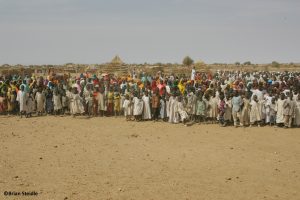International community/UNAMID
In September 2004, the U.S. Secretary of State Colin Powell applied the label of ‘genocide’ to Darfur – the first time the US Congress had done this during an ongoing conflict. However, despite this and the ICC indictments, international intervention in the conflict has been limited.

Refugees in Menawashi © Brian Steidle
An African Union force of 7,000 troops was deployed in 2004 but was understaffed and did not have the mandate to intervene to prevent atrocities – just to monitor them.
International non-governmental organisations around the world held a Global Day for Darfur in September 2006 and 2007 calling on the International Community to protect civilians and for the Sudanese Government to allow the United Nations into the region.
In 2007 the UN upgraded the international military presence in Darfur by creating the African Union-United Nations Mission in Darfur (UNAMID). Its mandate was to protect civilians and deliver humanitarian aid.
In July 2011, the Sudanese government and Liberation and Justice Movement, one of the rebel groups, signed the Doha Document for Peace in Darfur. This included agreements regarding wealth sharing, restitution for Darfuri survivors, a ceasefire agreement, release of JEM prisoners in Khartoum and recognition of JEM as a political party. UNAMID was tasked with administering this agreement on the ground. However, violence in Darfur has continued since this agreement was signed.
In 2009, the International Criminal Court issued a warrant for the arrest of Sudan’s President on charges of Crimes Against Humanity and War Crimes in Darfur. A second round of indictments was issued by the ICC in July 2010, this time incorporating charges of genocide. To date, he has not been arrested.
In April 2019, Omar al-Bashir was removed from power following protests and violent clashes in Sudan, and he is currently serving a two-year prison sentence for corruption. Following this, UNAMID was replaced with the UN Integrated Transition Assistance Mission in Sudan (UNITAMS) which was established in June 2020 to aid Sudan’s political transition to democratic rule.
For more information:
- Watch the testimony of Mukesh Kapila, the UK diplomat who was the first to call the atrocities in Darfur genocide
- Brian Steidle attempted to bring the genocide to the world’s attention after serving as a Captain in the American Marines in Darfur.
- Read about how he spoke out when he felt the conflict was going unnoticed
- Brian speaks about his experiences in his documentary The Devil Came on Horseback
- Brian has kindly provided us with photographs he took in Darfur for you to use at Holocaust Memorial Day activities